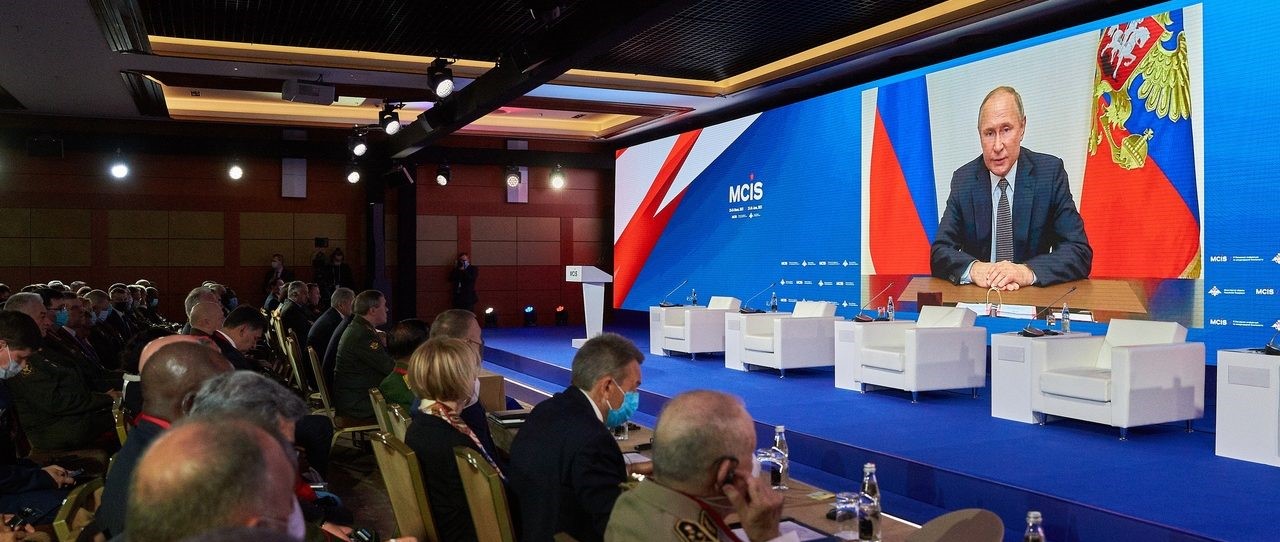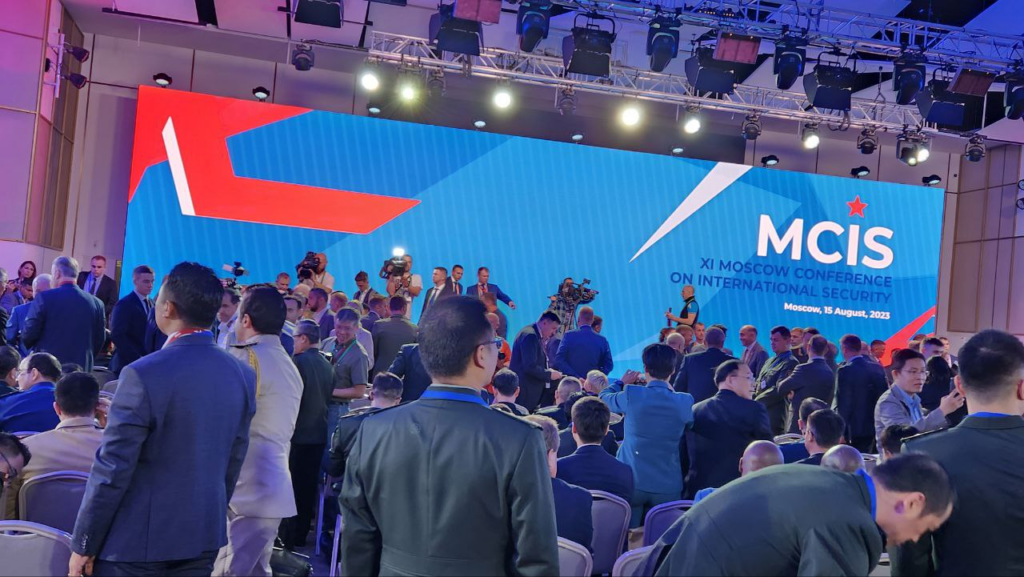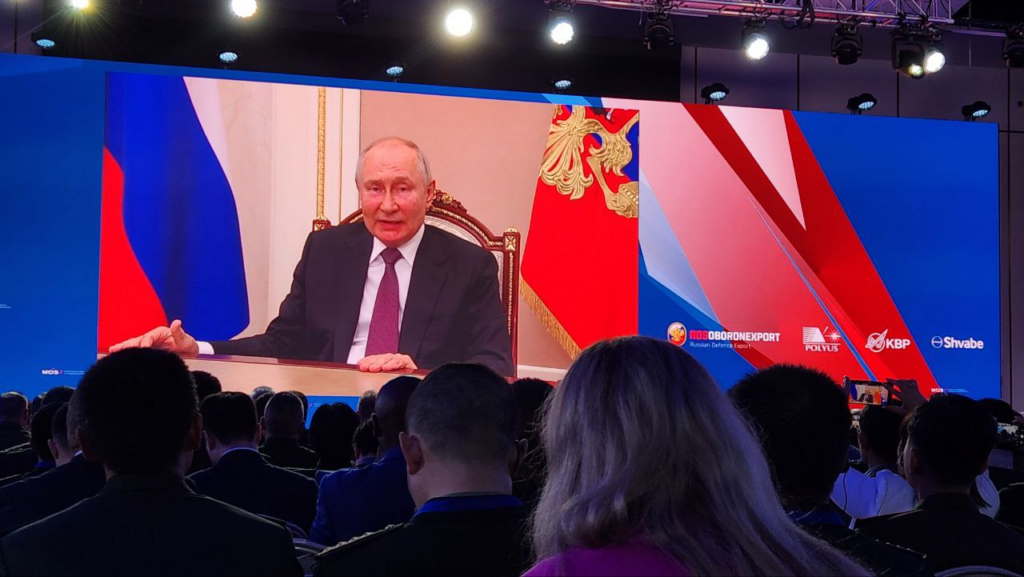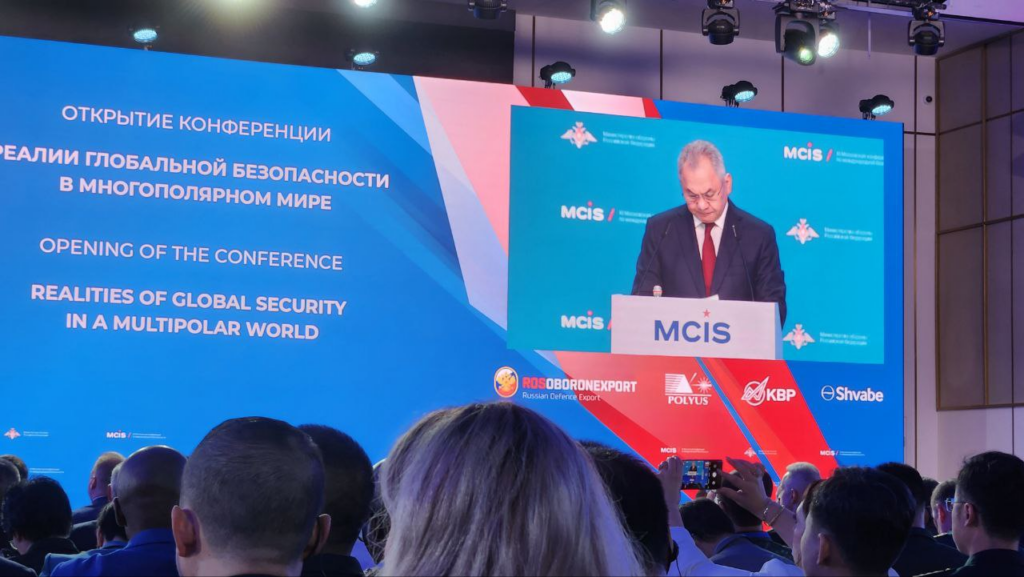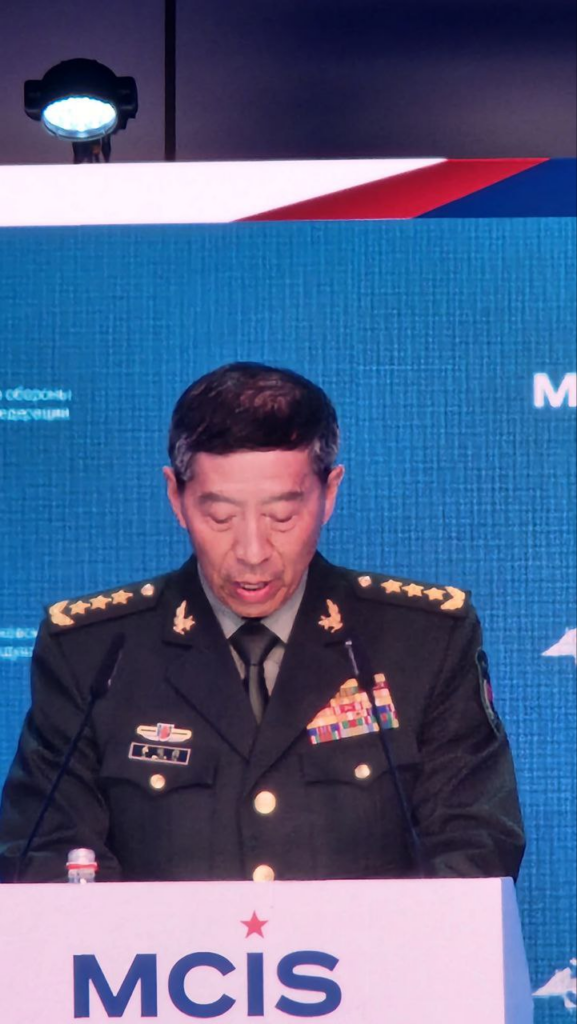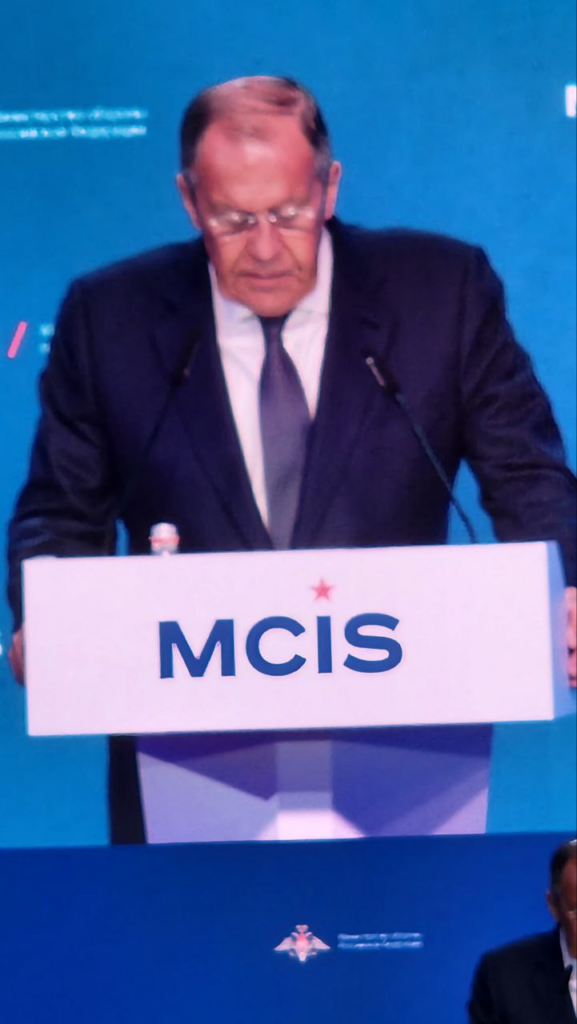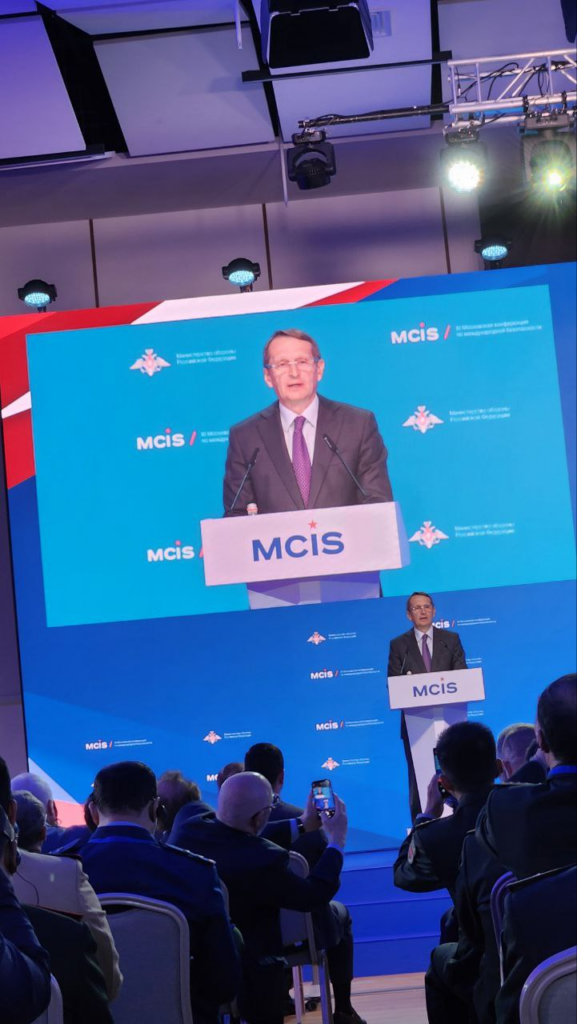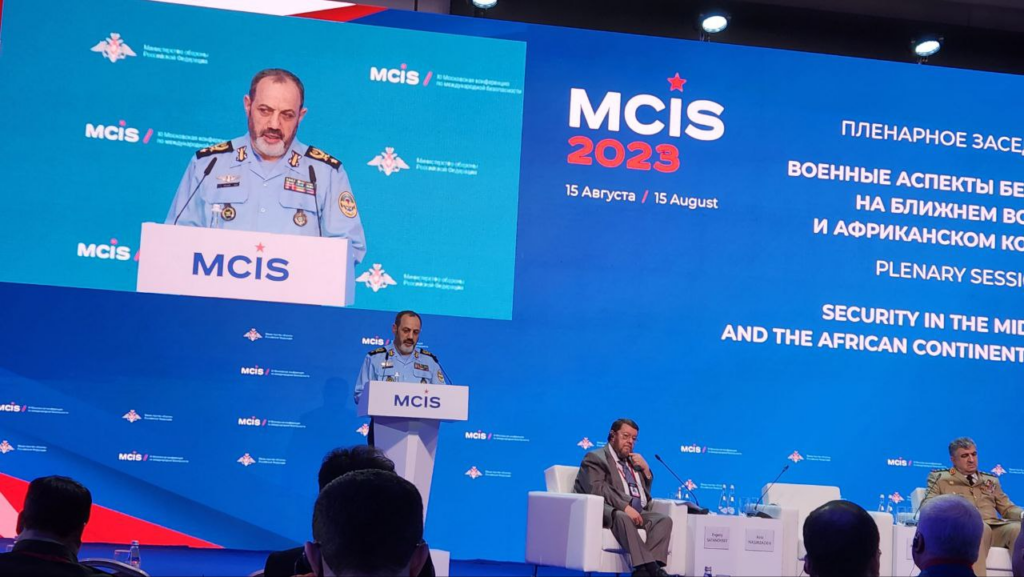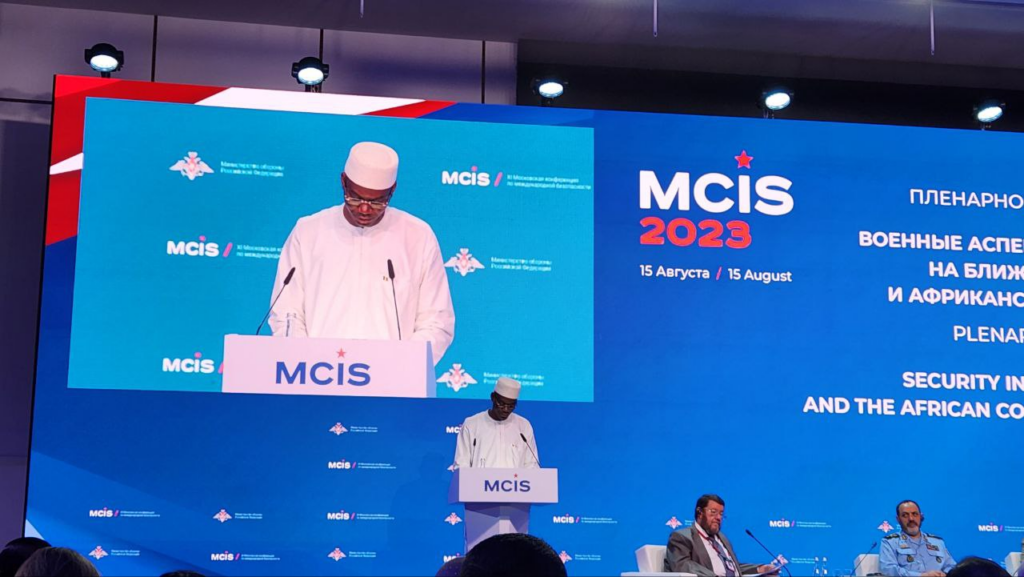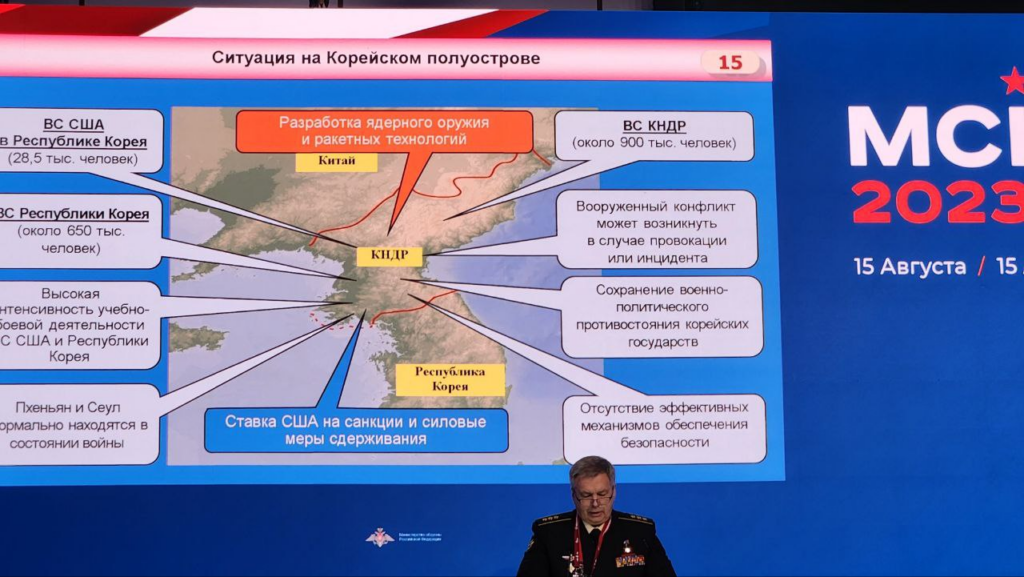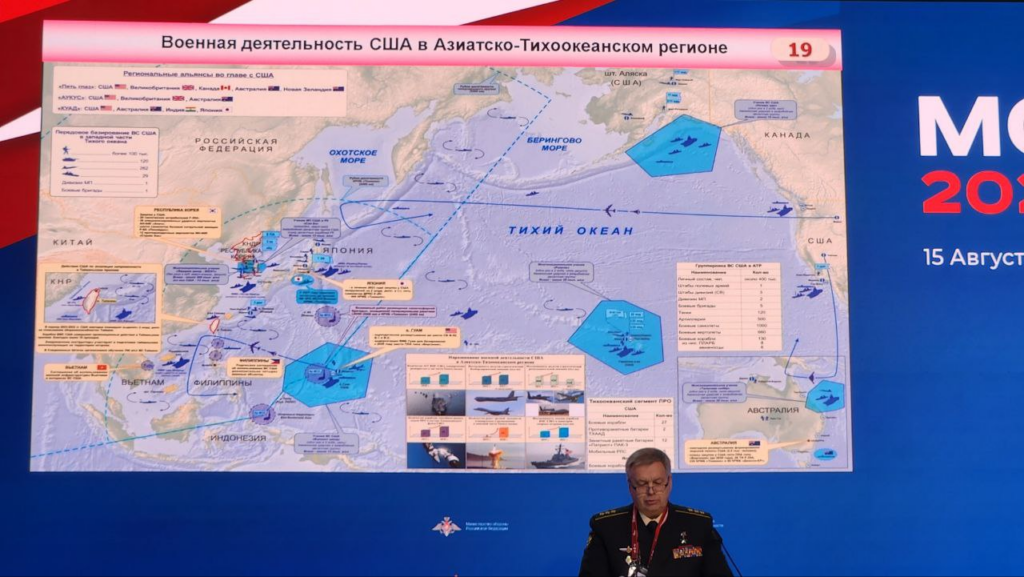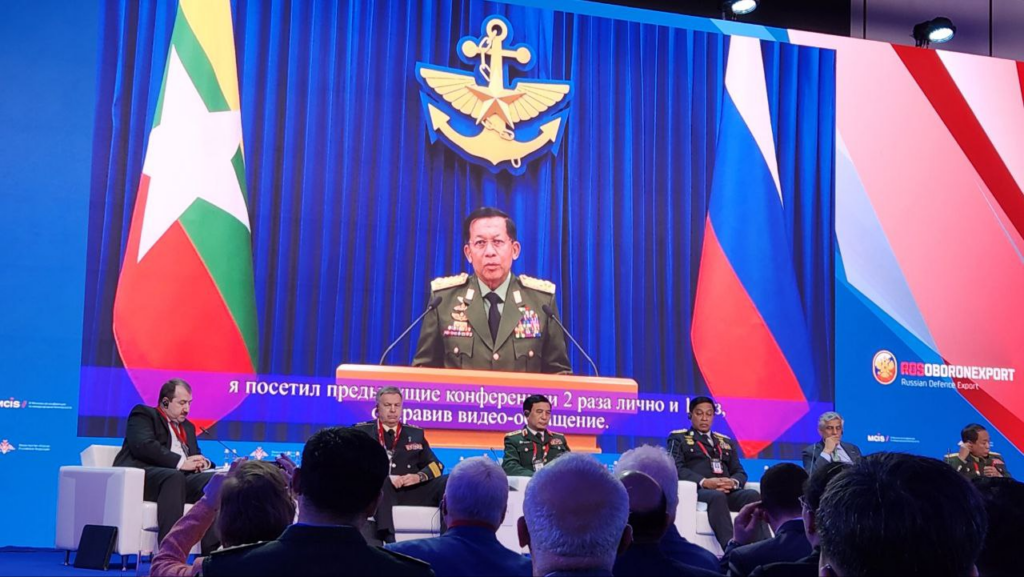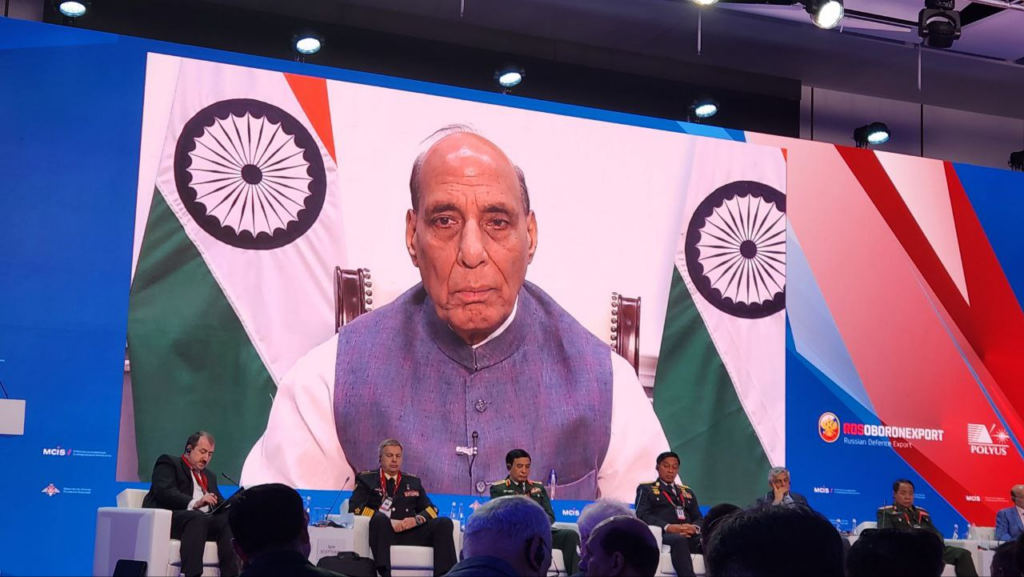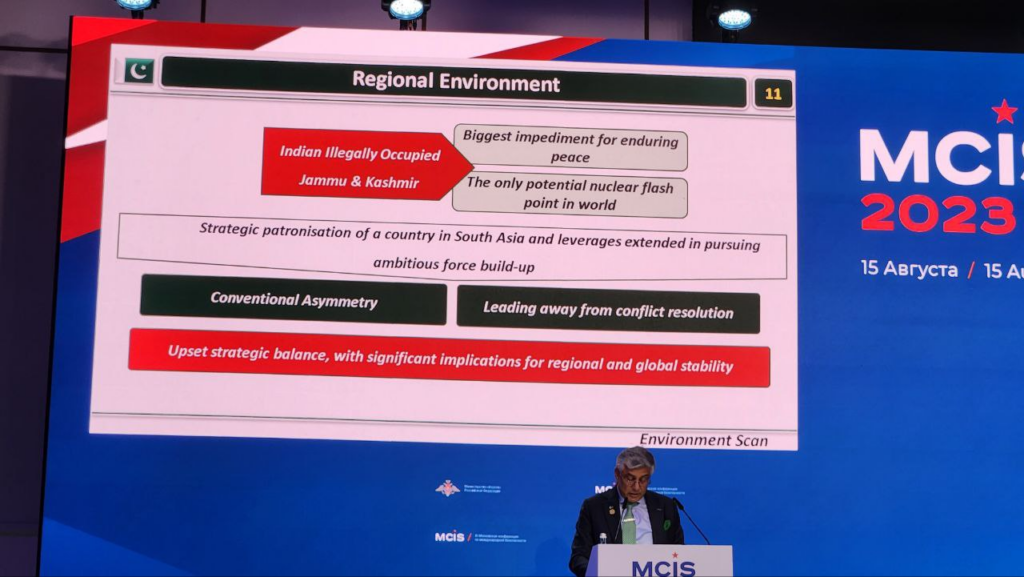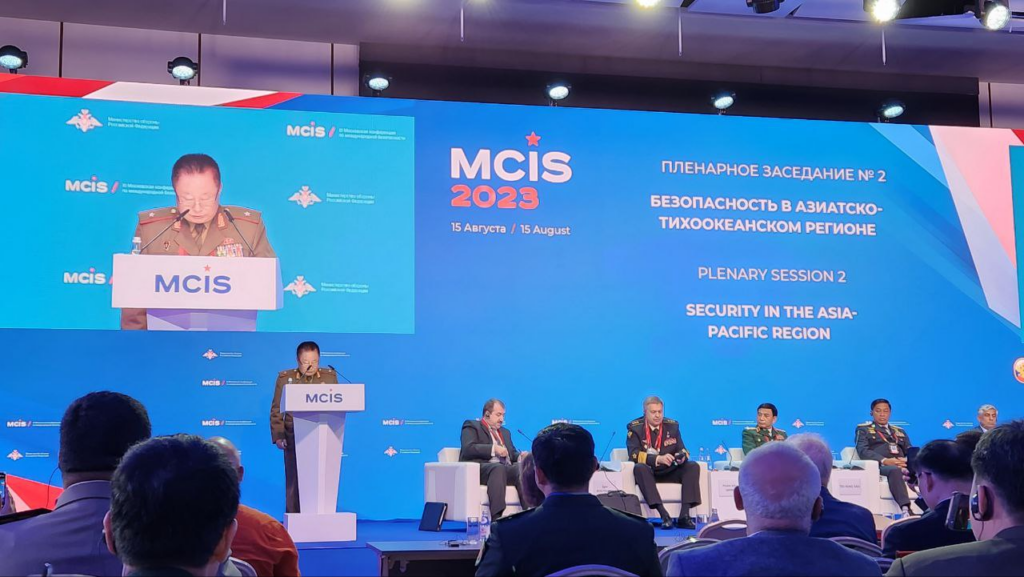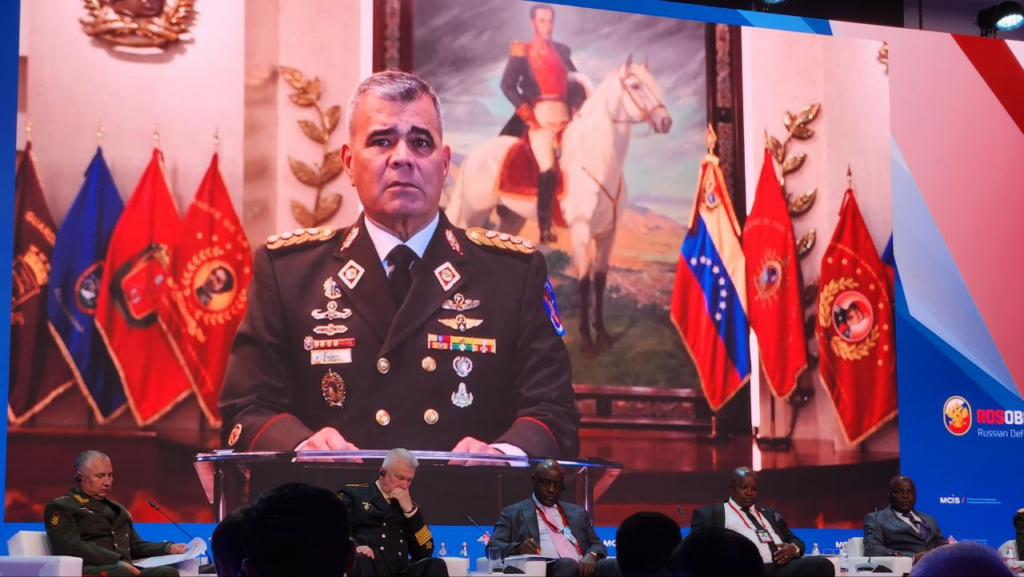On August 15, 2023, the Russian Ministry of Defense conducted the XI Moscow Conference on International Security. The Patriot Congress and Exhibition Center held a Conference and gathered over 800 participants from 76 countries and six international organizations[1].
The overall spirit of the Conference resonated with contemporary Russian foreign and defense policies. The event kept the trend of a consistently decreasing share of Western colleagues among the participants. Thus, Moscow traditionally welcomed its strategic partners from the Asia-Pacific, Middle East, Africa, and Latin America.
The welcoming address to the participants and guests of the event by Vladimir Putin, the Russian President, opened the XI Moscow Conference on International Security. In this message, Vladimir Putin stressed attention that the “West’s reckless geopolitical undertakings and selfish neo-colonial actions caused contemporary security challenges in the international arena”. While emphasizing the incremental tensions across the Asia-Pacific, the President of Russia expressed concerns about the possible military integration of NATO and AUKUS which will only undermine the geopolitical architecture in the region. He ended the speech by reiterating that Russia has always been striving for a multipolar world and expressed the hope that the Moscow Conference will become a venue to strengthen interstate relations among the participants.
Indeed, the event ultimately became an essential prerequisite for state participants to hold bilateral and multilateral talks on defense and security cooperation. In the face of the increasing political tensions worldwide and the intensifying anti-Russian narratives in the West, the Conference was indispensable, in particular, to maintain and deepen inter-state networks across the globe.
Remarkably, the West-led neo-colonialism had been put into a frontier of a discourse about the actions of the Western powers. Thus, following the welcoming address by the Russian President, Sergei Shoigu, the Russian Minister of Defense, highlighted that Russia fights against the Western neo-colonial trends worldwide, including in Ukraine.
It is worth noting that the Russian Minister of Defense stressed additional attention to the Special Military Operation. For example, Sergei Shoigu emphasized that Russia may reconsider the decision not to use cluster munitions[2] in Ukraine and pointed out that the actions undertaken by the Ukrainian Army on the Zaporizhzhia NPP may escalate a nuclear catastrophe.
Recalling the Ukrainian crisis was highly anticipated, but what was its strategic input? In brief, it resonates with the Russian Pivot to Asia foreign policy track. More specifically, it is worth noting that among the participants were members of ASEAN, the Shanghai Cooperation Organization, and the Collective Security Treaty Organization. Therefore, with most of the Russian allies and partners participating, it was particularly significant to address the Western hegemonic aspirations to encourage unity and collective actions within the political East, with its core in the Asia-Pacific region, where the Russian Federation should be a driving force in frames of global competition.
The spirit of the Pivot to Asia policy was also evident when the Russian Minister of Defense expressed the willingness to deepen techno-military cooperation with the Russian partners in the Asia-Pacific region. Yet Sergei Shoigu did not limit the message in favor of the Asian countries but also included Russian emerging partners in Latin America and Africa.
It also resonates with the modern security challenges Russia faces. There is an incremental narrative about the Cold War-like atmosphere, and indeed the re-division of the world is now happening, which was repeatedly recalled across the globe. The Conference in Moscow turned out to be a chance for the Russian Federation to enlist the support of new strategic partners in other parts of the world.
Later this session on the Realities of Global Security in a Multipolar World, Sergei Lavrov, the Russian Foreign Minister, gave a speech about the incremental tensions between leading powers and increasing risks of direct military confrontation. He insisted that the United States undermines and disrupts the international arms control regime by encroaching on its milestone – the Treaty on the Non-Proliferation of Nuclear Weapons (NPT) through the AUKUS nuclear deal[3].
Reflecting on the possibility of a direct military clash between the nuclear powers, Sergei Lavrov pointed out that the risk now seems evident. Thus, the Russian Foreign Minister stressed additional attention towards the incredible proliferation of Western weaponry to Taiwan and Ukraine.
Regardless of the unstable nature of today’s world, the Russian high-level establishments expressed the hope for collective actions to maintain international peace and security along with deepening interstate dialogue within regional and international institutions, such as BRICS, SCO, and others. Thus, the ultimate picture presented by the Russian Federation is based on promoting the salience of Eastern unity opposing the Western hegemonic aspirations and neo-colonial policies.
Among the foreign guests who presented during the opening session on the Realities of Global Security in a Multipolar World, the XI Moscow Conference on International Security welcomed Li Shangfu, the Chinese Defense Minister, the Belarusian President Aleksandr Lukashenko, and Viktor Khrenin, the Defense Minister of Belarus.
The speech of the Chinese Defense Minister on global affairs have been unsurprisingly restrained and relatively neutral. Even though Li Shangfu stated that China would oppose a military hegemony of those interfering in the domestic affairs of other countries, he also emphasized that China’s military cooperation with Russia is not targeted at any third country.
Resonating with the Chinese foreign policy track, the Chinese Defense Minister also pointed out that the PRC is responsible for maintaining the international non-proliferation and arms control regime. Recalling the approach of non-targeting in the Chinese military and defense partnerships with foreign partners, Li Shangfu also expressed a willingness to deepen military cooperation with Iran and Belarus and strengthen collective military actions in frames of SCO.
Overall, as mentioned above, the speech of Li Shangfu was cautious enough, which corresponds to the Chinese foreign policy approach – striving for international peace and security while avoiding labeling any country as an enemy or a root cause of security threats.
In his speech, Aleksandr Lukashenko, the President of Belarus, mostly resonated with the Russian views on global powers’ competition. Thus, Aleksandr Lukashenko noted an incremental risk of WMD usage in the face of the increasing confrontation in the international arena.
Accordingly, the Belarusian President stated that placing tactical nuclear weapons on the territory of Belarus is the Russian logical response to the security challenges in Europe and recalled that the issues of information wars, cybercrimes, and the Western powers’ accelerated militarization of Eastern Europe are destabilizing factors in an already unstable geopolitical environment.
Viktor Khrenin, the Defense Minister of Belarus, further supplemented the President’s speech by stressing attention to the increasing risks of the World War III in the face of the Ukrainian crisis. Viktor Khrenin noted that the Global West consistently dismantles the international arms control regime. According to Viktor Khrenin, the West is increasing its military preparedness, and the risk of a military confrontation involving NATO is now evident, which is the main reason behind the intentions of the Republic of Belarus to update its nuclear arsenal.
The statements of the Belarusian counterparts resonate with today’s security concerns the Republic of Belarus is facing. Specifically, Aleksandr Lukashenko has constantly reiterated in his speeches to the press and other media sources that the West is trying to involve Belarus in the European conflict. By declaring the intent to increase nuclear cooperation with Russia at the Conference in Moscow, Aleksandr Lukashenko sends a clear message to the West that the State takes the existing threats most seriously and prepares for a response if needed.
Then, the Conference resumed with the three consecutive sessions:
- Security in the Middle East and the African Continent: military aspects;
- Security in the Asia-Pacific Region;
- Interaction of defense agencies: conditions and expectations.
Herein, the most substantial and resonant statements were collected. Expectedly, all the presenters primarily referred in their speeches to the vital national interests of their states and pointed out the pressing security challenges they are facing right now.
Thus, Aziz Nasirzadeh, Deputy Chief of Staff for the Armed Forces of the Islamic Republic of Iran, stated that the “devastating war in Ukraine would not have happened without the West’s hegemony and excessive demands led by the US”. Aziz Nasirzadeh added that in the face of the increasing confrontation worldwide, the fall of the American hegemony seems now evident.
Moreover, the Conference became a salient venue for Russia and Iran to discuss deeper military cooperation between the two countries. Both sides underscored the importance of such a bilateral dialogue, which is an indispensable step forward, primarily upon the recent joining of Iran to the SCO and the ongoing process of Iran becoming a full-fledged member of BRICS.
Furthermore, the Conference has not gone without discussions on the ongoing crisis in Niger. Thus, Saïd Chengriha, Chief of Staff of the Algerian Armed Forces, and Sadio Camara, Defense Minister of Mali, opposed military intervention in Niger and noted that there is an effective cooperation mechanism to coordinate the talks among Algeria, Niger, Mali, and Mauritania. Sadio Camara also stated that Western power superiority, accompanied by arrogance, is the primary cause of the crises in CAR, Mali, Burkina-Faso, Niger, and Western Africa.
The talks over the crisis in Niger also manifest the overall spirit of the Conference of the so-called Eastern perspectives on global issues. Yet it is particularly essential now to address the joint position of those participating in the panel to a broader audience in frames of international institutions like the United Nations.
Yet the Conference in Moscow turned out to be the platform where regional actors under the common goal gained a chance to declare their views on global security issues freely and openly.
It is also worth re-calling that earlier, the heads of the Russian and Algerian armies met in Moscow to deepen their military cooperation.
The Security in the Asia-Pacific Region started with Igor Kostyukov, Head of the Russian General Staff’s Main Intelligence Department, addressing the instability across the Korean Peninsula. Igor Kostyukov mentioned that the US is to blame for North Korea’s nuclear build-up.
Remarkably, later that day, during the last session, the North Korean Military Attaché to Russia said that the only way to prevent a nuclear war in the Korean Peninsula is to possess enough nuclear weapons for successful deterrence. Thus, the North Korean representative underscored explicitly that the DPRK intends to protect its national interests and resist security threats.
Another regional security challenge in the Asia-Pacific covered during the respective session was the situation over Kashmir. It is worth highlighting that while Rajnath Singh, the Indian Defense Minister, expressed general and vague views on the importance of non-violence and avoidance of escalation in the face of competition, their Pakistani counterparts’ speech, represented by Hamood Uz Zaman Khan, the Deputy Defense Minister, has been one of the most conceptual and straightforward. Most importantly, he pointed out that Kashmir is the only place on Earth where a direct nuclear exchange seems possible.
In conclusion, the results gained, and tendencies noted during the XI Moscow Conference on International Security are worth mentioning. Firstly, the Conference demonstrated that the global East could be self-sufficient; it has a voice and an opinion and is looking forward to enhancing intra-regional cooperation to counter the global West. The participants of the Conference were concerned about the current international instability and actively strived to maintain peace and security worldwide. Secondly, the Conference in Moscow became an essential venue for the participants to discuss bilateral and multilateral military cooperation. In particular, it was salient for the Russian Federation to maintain close ties with existing partners and increase collaboration with emerging ones. Thirdly, the global East is amazingly diverse, represented by the event participants’ different vital national interests and concerns. Yet, there is a foundation for further strengthening defense collaboration.
[1] Speeches of MCIS-2023 participants // MCIS. URL:
https://eng.mil.ru/en/mcis/speeches.htm.
[2] Read more about cluster munitions in the interview conducted by the PIR Center with Vadim Kozyulin, Head of the Center for Global Studies & International Organizations of the Institute for Contemporary International Studies of the Diplomatic Academy of the Russian Foreign Ministry, member of the PIR Center Executive Board. URL:
https://pircenter.org/editions/voennaja-jeffektivnost-takih-boepripasov-ochevidna-em-kassetniki-em-pozvoljajut-odnim-udarom-unichtozhit-bolshoe-voinskoe-podrazdelenie-intervju-s-vadimom-kozjulinym/ (In Russian).
[3] Read more about Russian position on the global nonproliferation and arms control regime in the article published by PIR Center following the results of the Preparatory Committee for the 2026 Review Conference of the Parties to the Treaty on the Non-Proliferation of Nuclear Weapons (NPT). URL:
https://pircenter.org/editions/budushhee-dnjao-vzgljad-iz-soveta-bezopasnosti-pozicija-rossijskoj-federacii/
On August 15, 2023, Dr. Vladimir Orlov, Founding Director of PIR Center, took part in the XI Moscow Conference on International Security. Let us share with you notes made in real time on the margins of the MCIS-2023. Read more in the Telegram channel (In Russian).
I am now attending the XI Moscow Conference on International Security. It is the 11th Conference, yet it is the 10th one for me, my anniversary, so to say (I couldn’t participate in the Conference last year). They say that there are representatives from 76 countries. Let’s check it…
In frames of the MCIS-2023 program, we expect to greet the Heads of State of several countries, particularly Myanmar, alongside the Defense Ministers of China, India, North Korea, Syria, Venezuela, Mali, and others.
Vladimir Putin, President of Russia: Russia opposes pitting people against each other in the face of Western neocolonialism.
Vladimir Putin, President of Russia: we do not exclude the future unification between NATO and AUKUS.
Sergey Shoigu, Russian Defence Minister: Special Military Operation is directed to counter Western neocolonialism.
Sergey Shoigu, Russian Defence Minister: we will share the expertise on the weaknesses of the captured (NATO) weaponry with our partners. It appears to be worse than the Soviet one.
Sergey Shoigu, Russian Defence Minister: the actions undertaken by the Ukrainian Army on the Zaporizhzhia NPP may escalate a nuclear catastrophe.
Sergey Shoigu, Russian Defence Minister: we may also reconsider our decision not to use cluster munitions during the Special Military Operation.
Sergey Shoigu, Russian Defence Minister: Russia is concerned about AUKUS as it starts with the military-oriented nuclear deal.
Sergey Shoigu, Russian Defence Minister: bilateral relations between Russia and China are more than just a strategic partnership.
Sergey Shoigu, Russian Defence Minister: I’ve seen North Korea’s success in ensuring the security of the State. Strengthening military cooperation between Russia and the DPRK is in our mutual interest.
Sergey Shoigu, Russian Defence Minister: we will share our military expertise and experience in high-intensity combat with Cuba, Nicaragua, and Venezuela.
Sergey Shoigu, Russian Defence Minister: we will enhance military-technical cooperation with African countries.
Alexander Lukashenko, President of Belarus: the risks of WMD usage are increasing.
Alexander Lukashenko, President of Belarus: the placement of tactical nuclear weapons on the territory of Belarus is the Russian logical response to the security challenges in Europe.
Li Shangfu, Chinese Defense Minister: China is a responsible global power in maintaining the international arms control regime. China fosters peace and security, for instance, concerning the dialogue between Iran and Saudi Arabia.
Li Shangfu, Chinese Defense Minister: we will oppose the military hegemony of those interfering in the internal affairs of other States.
Victor Hrenin, Defense Minister of Belarus: the war between the West and the East in Ukraine places the world on the edge of the World War III. The Global East is far away from the Global West. The West introduces a new way of slavery, but now it is tied to their citizens. It is manipulating their minds to undermine the relations of Slavic people.
Victor Hrenin, Defense Minister of Belarus: the Global West is now consistently dismantling the international arms control regime. They are increasing their military preparedness. The risk of a military confrontation involving NATO as a whole is now evident. The only constraint they consider is a nuclear strike. This is why Belarus is now looking forward to an updated nuclear arsenal.
Victor Hrenin, Defense Minister of Belarus: it is indispensable to prevent the World War by any means now, or it will be too late.
Sergey Lavrov, Russian Foreign Minister: the United States undermines and disrupts the international arms control regime. They even encroach on its milestone – the Treaty on the Non-Proliferation of Nuclear Weapons (NPT) through the AUKUS nuclear deal. Among other things, they consistently strive to take Japan and South Korea to this illegitimate adventure.
Sergey Lavrov, Russian Foreign Minister: now the risk of the direct military clash between nuclear powers seems evident.
Sergey Lavrov, Russian Foreign Minister: the Western view on Taiwan is cynical. There’s an incredible proliferation of Western weaponry to Taiwan, the same way as the Global West sponsors Ukraine.
Sergey Lavrov, Russian Foreign Minister: the global community is now experiencing an increasing role, prestige, and attractiveness of BRICS. We believe in the upcoming expansion of the Organization in Johannesburg, which will undoubtedly solidify the intra-organizational relations.
Sergey Lavrov, Russian Foreign Minister: the United States and its allies regularly conduct uncontrollable military-oriented biological programs all over the world, breaching the provisions of the Chemical Weapons Convention.
Sergey Naryshkin: the level of nihilism and uncertainty is increasing. Yet we will oppose the Western liberal dictatorship.
Sergey Naryshkin: the shreds of the evidence of blatant corruption in the Biden family have become a byword.
Sergey Naryshkin: the International Criminal Court has gone mad.
Sergey Naryshkin: Woe to those who misinterpret darkness and light.
Sergey Naryshkin: the West opposes traditional religions that lay the foundation of widely accepted moral principles. The Western World is the Heretic World.
Sergey Naryshkin: a morally educated and spiritually evolved man now fears going to Europe.
Sergey Naryshkin: I also want to emphasize the illegitimate occupation by the Western neo-colonialists of New Caledonia and the Chagos Archipelago.
Sergey Naryshkin: today’s world is an exuberant garden with hundreds of flowers blooming.
Sergey Naryshkin: BRICS is amazingly durable, and it will be strengthened further!
Aziz Nasirzadeh, Deputy of Chief of Staff for the Armed Forces of the Islamic Republic of Iran: the fall of the American hegemony seems now evident. We are currently at the transit point.
Aziz Nasirzadeh, Deputy of Chief of Staff for the Armed Forces of the Islamic Republic of Iran: SCO and BRICS aim to increase their members’ power and self-sufficiency in favor of a new world order.
Chief of General Staff of the Algerian Army: Algeria opposes military intervention into Niger. An effective cooperation mechanism exists to coordinate the talks among Algeria, Niger, Mali, and Mauritania.
Sadio Camara, Defense Minister of Mali: Western power superiority accompanied by arrogance is the primary cause of the crises in CAR, Mali, Burkina-Faso, Niger, and Western Africa, in general.
Sadio Camara, Defense Minister of Mali: in our region, those who initiated the crises pretend to be those who strive for a resolution. Unfortunately, my country suffered from this as well.
Igor Kostyukov, Head of the Russian General Staff’s Main Intelligence Department: the US is to blame for North Korea’s nuclear build-up for deterrence purposes.
Igor Kostyukov, Head of the Russian General Staff’s Main Intelligence Department: AUKUS is a threat to security and stability in the Asia-Pacific region.
This year, General Min Aung Hlaing, the Chairman of the State Administration Council of Myanmar, attended the XI Moscow Conference on International Security virtually, sending a video message to the participants of the Conference and wishing them spiritual enlightenment.
General Min Aung Hlaing, the Chairman of the State Administration Council of Myanmar: the US and the Global West threaten the unity of ASEAN. We also suffer from the American diktat of the dollar.
Rajnath Singh, the Indian Defense Minister, also joined the Conference virtually, unfortunately. We need more direct negotiations between Moscow and New Deli. Yet Rajnath Singh covered the issues of the importance of non-violence and avoidance of escalation if the face of competition.
The Pakistani Deputy Defense Minister noted that Kashmir is the only place on Earth where a direct nuclear exchange seems possible. Generally, his presentation has been one of the most elaborated and conceptual enough, especially compared to the one of the Indian Defense Minister.
In the Patriot Park, the North Korean Military Attaché to Russia emphasized that the Korean Peninsula needs de-escalation. Unfortunately, the North Korean Defense Minister couldn’t attend the meeting.
North Korean Military Attaché to Russia: the only way to prevent a nuclear war in the Korean Peninsula is to possess enough nuclear weapons for successful deterrence. In Pyongyang, we understand that any US dialogue proposal with no preconditions is just a bluff. The United States should care about itself as North Korean forces can reach anywhere in the US. Notably, it was one of the few presentations in English, and it seemed it was addressed to Washington rather than to Moscow.
Which African countries have been the most active at the Conference held by the Russian Ministry of Defense? Which countries have mostly made a friendly statement towards Russia? The top three are Mali, Algeria, and Uganda. The following rank consists of Guinea, Cameroon, and Burundi. Yet the Conference lacked the views of essential players like Egypt and South Africa.
Vladimir Padrino López, Minister of Defense for the National Armed Forces of the Bolivarian Republic of Venezuela, joined us virtually straight from Karakas. With Simon Bolivar in the background, he denounced (West) American imperialism for their support of coups d’etat and attempts to gain control over the natural resources in Latin America. Venezuela has enough evidence to talk about these issues.
The Minister of Defense of Venezuela considers Venezuela’s joining BRICS desirable. He also supposes that emerging integration institutions in Latin America and the Caribbean, without the participation of the US, can turn the region into a source of stability in favor of the interests of the states across the region and the globe.
Key words: Global Security
GRS/RUF

